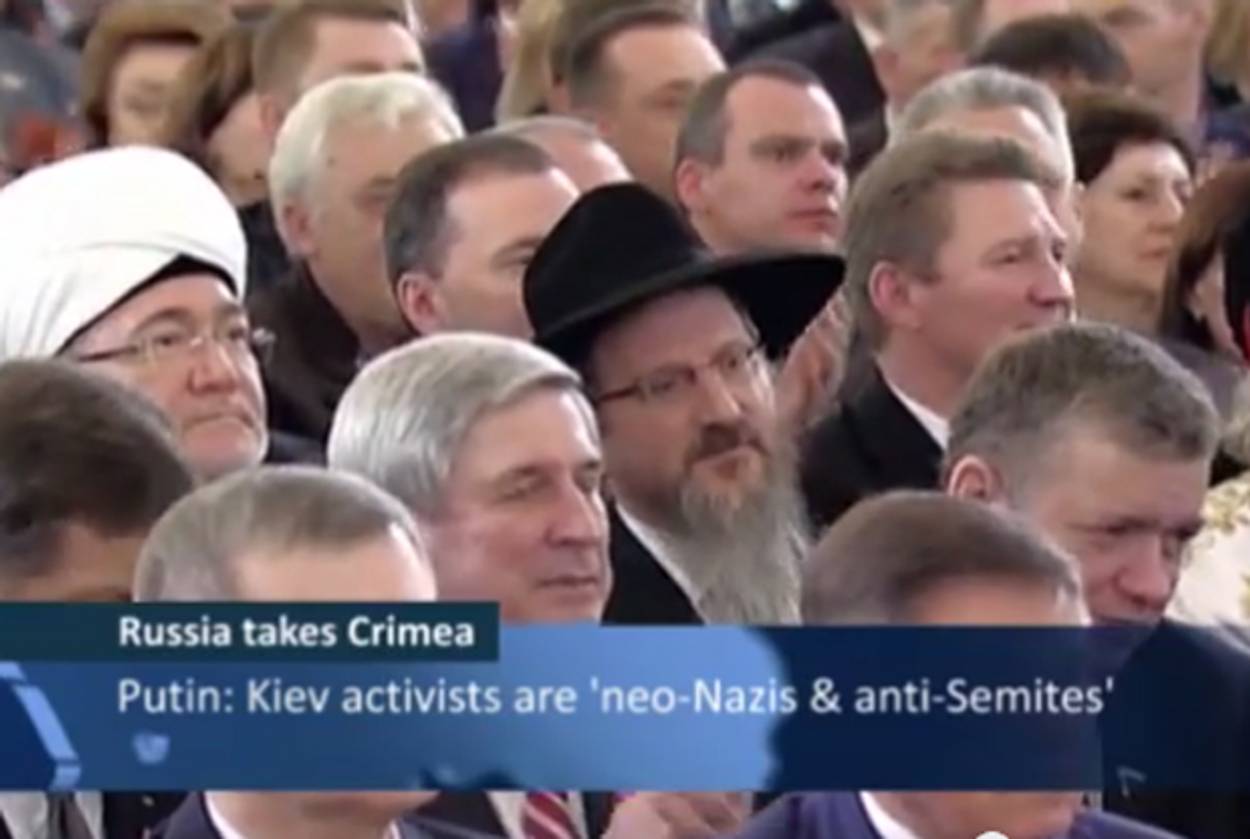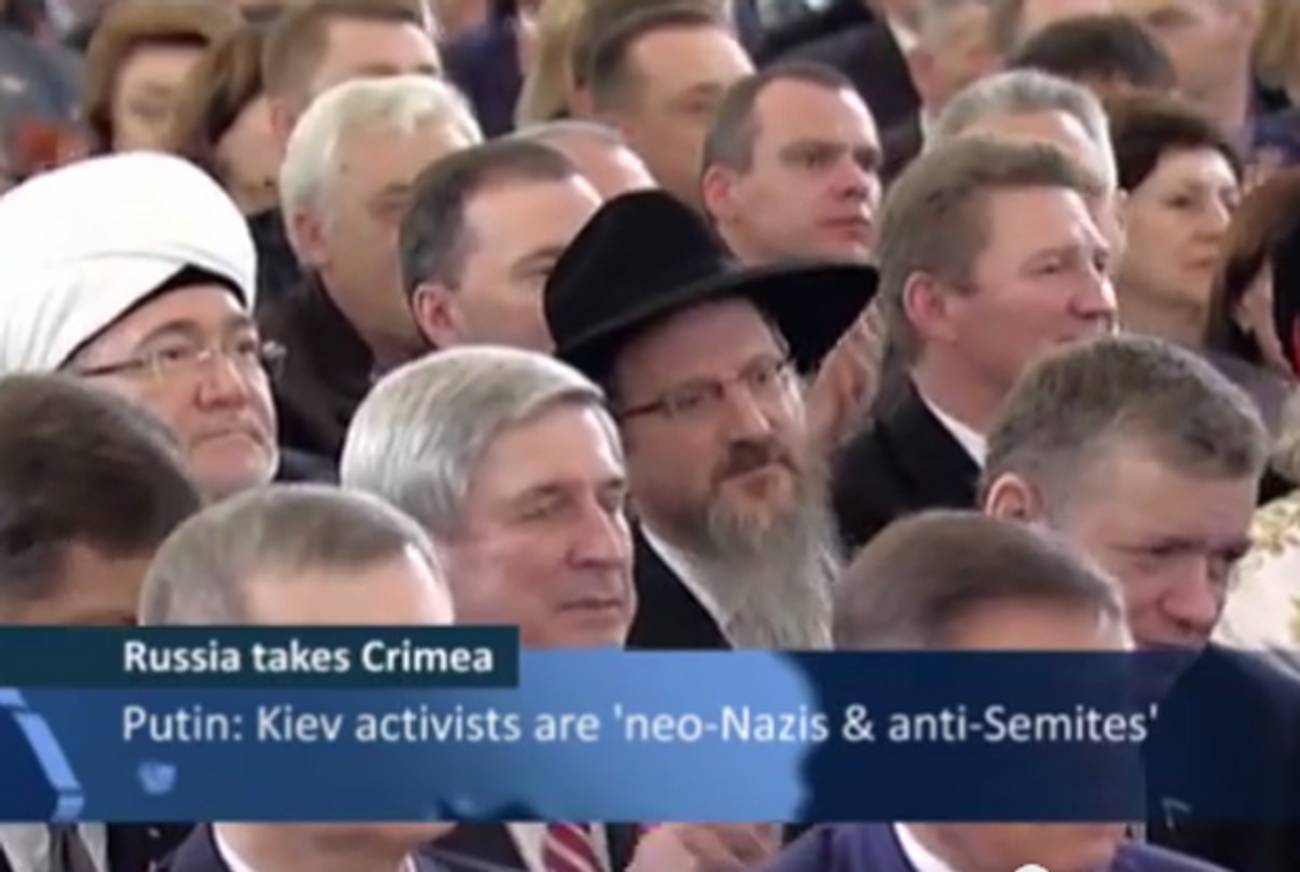Russia’s Chief Rabbi Cheers Crimea Annexation
Berel Lazar, who has close ties with Putin, seen in audience at Kremlin event




Yesterday, Russia’s president, Vladimir Putin, hosted a ceremony at the Kremlin, which formally began the process of incorporating Crimea into Russia and prompted Ukraine’s withdrawal from the region today. In news footage from the event, the tone of which was triumphant, Russia’s chief rabbi, Berel Lazar, a 49-year-old Chabad Lubavitch emissary, clapped along with the rest of the crowd as Putin spoke.
His presence wasn’t unusual: Lazar is a highly public figure, and is known for having developed close ties with Putin in the years he has spent working in Russia. In the past two decades, Lazar has spearheaded a remarkable revival of Jewish life in a city, and a country, that had almost none left by the time the Soviet Union collapsed, more than two decades ago: Dozens of synagogues and community centers have opened, and there are thousands of children enrolled at Jewish schools and kindergartens. Not all of these facilities are under the umbrella of Chabad, but the vast majority are; under Lazar’s leadership, Chabad now has representatives in neary 50 cities across Russia, and runs dozens of schools that enroll thousands of young Jewish children.
But as Putin’s regime has grown increasingly heavy-handed in its affairs, critics argue that Lazar’s success has come at a price. A 2007 story in the Wall Street Journal described it as “a Faustian bargain with the Kremlin”—one designed, according to the Journal, to privilege Chabad over other Jewish organizations. “Chabad-Lubavitch enjoys unparalleled political influence and has been allowed to gain control of millions of dollars worth of communal property from the Russian state, often trouncing rival claims from other Jewish organizations, critics say,” the reporter, Guy Chazan, wrote. In exchange, Chazan explained, Lazar has willingly acted as an emissary for Putin around the world, including in Washington, where he actively lobbied members of Congress to repeal the Jackson-Vanik sanctions against Russia, a cornerstone of the Cold War fight to free Soviet Jewry.
Others have been even more pointed in their critiques. In a 2008 Haaretz story, Anshel Pfeffer reported that Lazar “has been accused of everything: of using economic and political power to get rid of rivals, of forcing Chabad on Russia’s secular Jewry, of serving as an ‘informer’ and turning Jews in to the authorities and of whitewashing cases of anti-Semitism to curry favor with the regime.” Pfeffer was referring to the 13 students from a yeshiva not affiliated with Chabad who in October of 2007 were arrested hours before Shabbat, held over the Sabbath, and subsequently deported from Russia. “Even within his own movement, Chabad, there were those who said he had not advanced the interests of the religious in order not to damage his good relations with the regime,” Pfeffer added—a dynamic that most recently played out in Lazar’s decision to side with Putin in a fight with his New York brethren over 15,000 books belonging to the Lubavitcher Rebbe, Menachem Mendel Schneerson, which has resulted in Moscow’s refusal to allow loans of other works to American museums.
In the Hebrew version of Pfeffer’s article, Lazar acknowledged his privileged access: “It’s true that officially, I am close to Putin, but they don’t mention that it’s only about Jewish issues in Russia,” he said. But, he went on, “It’s like the criticism that President Putin absorbs that’s not connected to him. People don’t understand the situation in this country.” Nevertheless, he continued: “When I go to sleep at night, I want to feel that I did the maximum for the Jewish people. My primary interest lies with Russian Jews. After that the Jews in Israel, and in third place all the Jews of the world and after that—if I can, also worry about every person in Russia, to help the Russian government.”
Last week, Lazar’s spokesman Boruch Gorin declined to comment on how Moscow was handling the crisis. “It is one of the rare moments that we are sure that we, and all Jewish leaders, have to keep silent about the political part of the issue and concentrate much more on the humanitarian part,” he told me. “The question is so complicated, so sophisticated. Now, every word can be used not for good. That’s why from the side of responsibility, Jewish leaders don’t have to intervene.” Today, Gorin did not respond to a call seeking comment; a spokesman at the Chabad headquarters in Crown Heights declined to speak on Lazar’s behalf.
Lazar is in a complicated position. He is right—Russia is not the United States, and the penalties paid for lack of fealty to the Kremlin are unknown and perhaps unknowable. Certainly the spread of Chabad institutions would be impeded by any public opposition to Putin’s hostile takeover in Crimea. And yet, one might also argue that for a religious authority to clap for the annexation of Crimea—let alone for a Jewish authority to celebrate military action that has prompted his fellow Jews to flee–begs the question of what that authority is for.
Editor’s note: An earlier version of this post incorrectly suggested the 13 yeshiva students arrested in 2007 were extradited, rather than deported, from Russia.
Related: Royal Wedding
Batya Ungar-Sargon is a freelance writer who lives in New York. Her Twitter feed is @bungarsargon.